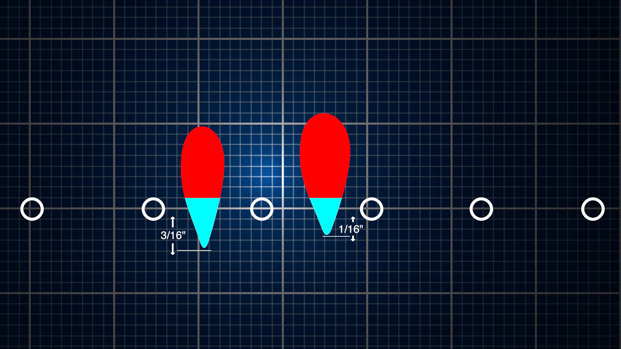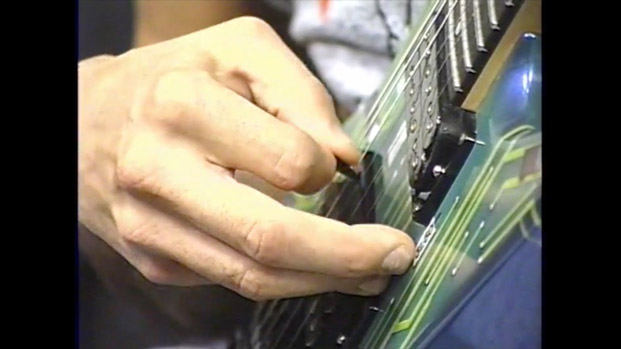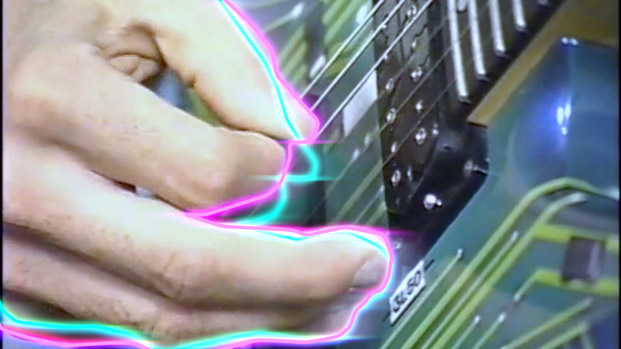Conquering the Scale with Michael Angelo Batio
Even though we tend to think of scale playing as the ultimate speed test, speed itself isn't really the problem. It's switching strings.
All the latest guitar news, interviews, lessons, reviews, deals and more, direct to your inbox!
You are now subscribed
Your newsletter sign-up was successful

Scale playing is the most elemental expression of technical skill in music. From pianists to violinists, mastering this simple linear exercise is a rite of passage for new players.
And yet, when it comes to picks and strings, the situation is completely reversed.
On the guitar, superior scale playing ability has long been regarded the as the domain of the ultra elite. Even in the technique-obsessed Eighties, the alternate picked diatonic line was the Everest of musical feats, scalable (pun intended!) by rarified talents like Michael Angelo Batio, Paul Gilbert and—seemingly—few others.
What makes guitar scale playing so difficult?
String Switching
Turns out, not what we thought! Even though we tend to think of scale playing as the ultimate speed test, speed itself isn't really the problem. It's switching strings.
Playing a note with a guitar pick always involves dropping it into the strings. This only makes sense. You have to get some amount of pick on the string in order to pluck it. And even if you use a tiny amount of pick, as many players recommend, you still have to lift it back out again or you'll hit the next string:
All the latest guitar news, interviews, lessons, reviews, deals and more, direct to your inbox!

We don't often think about this lifting and dropping component of picking technique, instead focusing on the rapid back and forth movement of alternate picking. And that's our downfall. If you've ever attempted to play scales and patterns that move across the strings at high speed, you've probably experienced that tangled-up feeling as the pick slams haphazardly into everything around it. This is what it feels like when string-switching fails.
To fix this, you'll need a specific recipe of hand movements, so that you can move smoothly over the *top* of the strings, even at blazing tempos. And there is no better way to learn these movements than by studying one of the most gifted scale players in the history of rock guitar: Michael Angelo Batio.
Batio Kills

Batio's 1991 Metal Method instructional video, Speed Kills, is one of the greatest examples of three-note-per-string virtuosity ever committed to VHS tape. It was a standout instructional performance, even in a decade known for standout instructional performances. From the first frame to the last, it was a tour de force of hyper-clean, impossibly consistent scale picking that seemed more android than human.
Sure, Batio was fast. But it was his extreme accuracy on Speed Kills that really impressed. Ascending phrases, descending phrases, looping phrases, and sequential phrases were all executed with utter effortlessness. These kinds of exotic lines were rare in the vocabularies of other guitar greats, but they were clearly meat and potatoes for Batio.
Was Batio was up to something? If there was a trick to this, it was hard to imagine what it might be.
Two-Way Pickslanting
As it happens, Speed Kills itself held the answer. When it comes to instructional videos, one of the criteria that separates the great from the merely good is the attention paid to picking hand closeups. And Speed Kills contained great ones. Filmed at a low angle with a telephoto lens, viewers were treated to zoomed-in closeups of Batio's picking hand with an uncommon level of clarity:

And slowing down that intimate telephoto shot revealed the key to his impeccable string-switching accuracy. Alongside the back and forth motion of alternate picking, there was an additional, undocumented and amazing movement.
During rapid ascending scalar lines, Batio would instantly flip the rotation of his forearm from upward to downward—or downward to upward—depending on the string he was moving toward. This caused the pick to lift into the air on an angle, like the "Fosbury Flop" technique that high jumpers use to roll over the bar with minimal clearance:

This incredible rotating pick was Batio's string-switching movement. It occurred alongside his alternate picking technique, and employed different muscle groups, so it didn't interfere with the picking movement itself, or cause a reduction in speed. Instead, it allowed Batio to continue his existing speed across complicated string changes, without interference.
In Cracking the Code terminology, we call this type of intermittent forearm rotation "two-way pickslanting":

Two-way pickslanting is probably the most popular method that elite players use for getting from one string to another during fast scale playing. And Batio is a master of it. At normal speed, he executes this forearm twist so quickly that you can just barely see it. But slowing down the Speed Kills footage revealed it. And in our live interview with Batio himself, filmed with a high-speed, slow-motion camera, the precision and consistency of his two-way pickslanting movements were electrifying.
The Keys to the Lamborghini
If simply explaining Batio's scale picking genius were all there was, it would be entertaining enough, like watching Shark Week. But the real value here is practical. These movements are not simply the idiosynratic quirks of an individual player. What Batio is teaching us are universal truths about the way the guitar is played.
By learning to replicate Batio's masterful two-way pickslanting fluidity, as we do in Cracking the Code, everyone can learn to navigate the strings with fluidity, precision, and most importantly, dramatically greater freedom of musical expression.
Watch the complete Michael Angelo Batio interview, with over forty slow-motion clips of Mike's incredible technique, and over an hour of detailed instructional commentary on achieving two-way pickslanting, in Masters in Mechanics!
Troy Grady is the creator of Cracking the Code, a documentary series with a unique analytical approach to understanding guitar technique. Melding archival footage, in-depth interviews, painstakingly crafted animation and custom soundtrack, it’s a pop-science investigation of an age-old mystery: Why are some players seemingly super-powered?
Troy Grady is the creator of Cracking the Code, a documentary series with a unique analytical approach to understanding guitar technique. Melding archival footage, in-depth interviews, painstakingly crafted animation and custom soundtrack, it’s a pop-science investigation of an age-old mystery: Why are some players seemingly super-powered?
